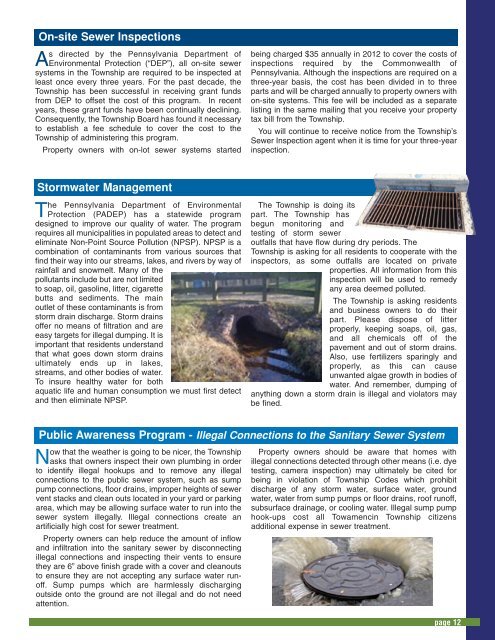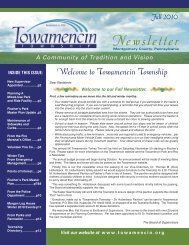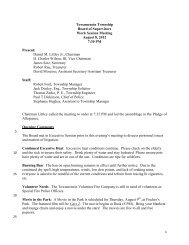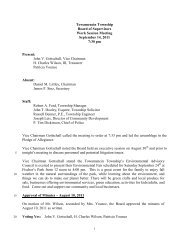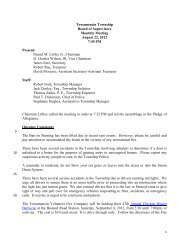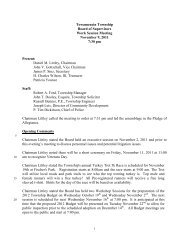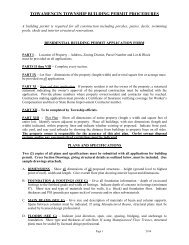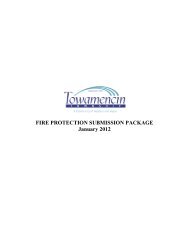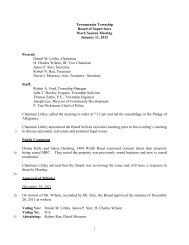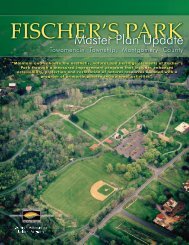Spring 2013 - Towamencin Township
Spring 2013 - Towamencin Township
Spring 2013 - Towamencin Township
You also want an ePaper? Increase the reach of your titles
YUMPU automatically turns print PDFs into web optimized ePapers that Google loves.
On-site Sewer Inspections<br />
As directed by the Pennsylvania Department of<br />
Environmental Protection (“DEP”), all on-site sewer<br />
systems in the <strong>Township</strong> are required to be inspected at<br />
least once every three years. For the past decade, the<br />
<strong>Township</strong> has been successful in receiving grant funds<br />
from DEP to offset the cost of this program. In recent<br />
years, these grant funds have been continually declining.<br />
Consequently, the <strong>Township</strong> Board has found it necessary<br />
to establish a fee schedule to cover the cost to the<br />
<strong>Township</strong> of administering this program.<br />
Property owners with on-lot sewer systems started<br />
being charged $35 annually in 2012 to cover the costs of<br />
inspections required by the Commonwealth of<br />
Pennsylvania. Although the inspections are required on a<br />
three-year basis, the cost has been divided in to three<br />
parts and will be charged annually to property owners with<br />
on-site systems. This fee will be included as a separate<br />
listing in the same mailing that you receive your property<br />
tax bill from the <strong>Township</strong>.<br />
You will continue to receive notice from the <strong>Township</strong>’s<br />
Sewer Inspection agent when it is time for your three-year<br />
inspection.<br />
Stormwater Management<br />
The Pennsylvania Department of Environmental<br />
Protection (PADEP) has a statewide program<br />
designed to improve our quality of water. The program<br />
requires all municipalities in populated areas to detect and<br />
eliminate Non-Point Source Pollution (NPSP). NPSP is a<br />
combination of contaminants from various sources that<br />
find their way into our streams, lakes, and rivers by way of<br />
rainfall and snowmelt. Many of the<br />
pollutants include but are not limited<br />
to soap, oil, gasoline, litter, cigarette<br />
butts and sediments. The main<br />
outlet of these contaminants is from<br />
storm drain discharge. Storm drains<br />
offer no means of filtration and are<br />
easy targets for illegal dumping. It is<br />
important that residents understand<br />
that what goes down storm drains<br />
ultimately ends up in lakes,<br />
streams, and other bodies of water.<br />
To insure healthy water for both<br />
aquatic life and human consumption we must first detect<br />
and then eliminate NPSP.<br />
The <strong>Township</strong> is doing its<br />
part. The <strong>Township</strong> has<br />
begun monitoring and<br />
testing of storm sewer<br />
outfalls that have flow during dry periods. The<br />
<strong>Township</strong> is asking for all residents to cooperate with the<br />
inspectors, as some outfalls are located on private<br />
properties. All information from this<br />
inspection will be used to remedy<br />
any area deemed polluted.<br />
The <strong>Township</strong> is asking residents<br />
and business owners to do their<br />
part. Please dispose of litter<br />
properly, keeping soaps, oil, gas,<br />
and all chemicals off of the<br />
pavement and out of storm drains.<br />
Also, use fertilizers sparingly and<br />
properly, as this can cause<br />
unwanted algae growth in bodies of<br />
water. And remember, dumping of<br />
anything down a storm drain is illegal and violators may<br />
be fined.<br />
Public Awareness Program - Illegal Connections to the Sanitary Sewer System<br />
Now that the weather is going to be nicer, the <strong>Township</strong><br />
asks that owners inspect their own plumbing in order<br />
to identify illegal hookups and to remove any illegal<br />
connections to the public sewer system, such as sump<br />
pump connections, floor drains, improper heights of sewer<br />
vent stacks and clean outs located in your yard or parking<br />
area, which may be allowing surface water to run into the<br />
sewer system illegally. Illegal connections create an<br />
artificially high cost for sewer treatment.<br />
Property owners can help reduce the amount of inflow<br />
and infiltration into the sanitary sewer by disconnecting<br />
illegal connections and inspecting their vents to ensure<br />
they are 6” above finish grade with a cover and cleanouts<br />
to ensure they are not accepting any surface water runoff.<br />
Sump pumps which are harmlessly discharging<br />
outside onto the ground are not illegal and do not need<br />
attention.<br />
Property owners should be aware that homes with<br />
illegal connections detected through other means (i.e. dye<br />
testing, camera inspection) may ultimately be cited for<br />
being in violation of <strong>Township</strong> Codes which prohibit<br />
discharge of any storm water, surface water, ground<br />
water, water from sump pumps or floor drains, roof runoff,<br />
subsurface drainage, or cooling water. Illegal sump pump<br />
hook-ups cost all <strong>Towamencin</strong> <strong>Township</strong> citizens<br />
additional expense in sewer treatment.<br />
page 12


